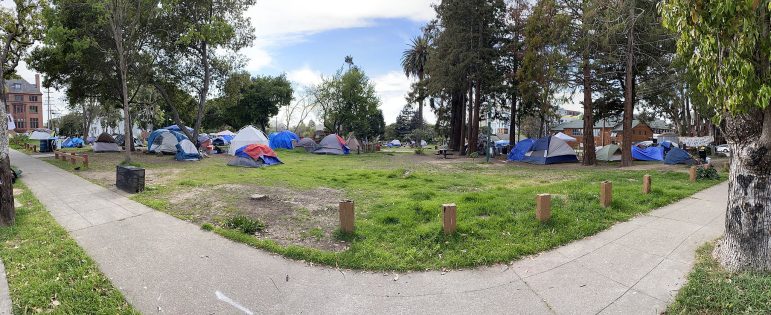
On the morning following the destruction of People’s Park, I went to the site to bring some shoes I thought some people could use. I found one person—an unhoused woman, badly dressed and pitifully thin, rocking slowly in a chair amid the debris of cut redwoods. Her eyes closed, she seemed to be silently weeping—her breathing barely audible. She was grieving the loss of her home—a place she had been a part of. Without disturbing her, I left the shoes and departed.
For me, she represented the grief felt by those who loved the Park. In 1969, at the time of the student rebellion over saving the Park as a place for trees and flowers, I was a student living in Southern Indiana. I was aware that my generation’s rage at the Vietnam War had spilled over into the capture of this small piece of land from the University. It was a symbolic act of “throwing our bodies on the machinery of society—corporations, government, and universities—that were hell-bent on feeding our US military aggression in foreign lands.
Anti-war protests were not uncommon in Berkeley at the time and war resisters across the country were inspired to initiate our own rebellions. We always knew that every day in Berkeley there would be anti-war actions, a fact that helped us overcome our own sense of helplessness as we opposed the war. Berkeley and its citizens became for us in middle America the city we could always anticipate challenging the unjust authorities who propagandized and led us into a series of violent foreign interventions in Asia, Latin America, Africa, and the greater Middle East.
This unrelenting parade of militarism and jingoism has continued into our own time and become a central factor in an economy increasingly centered on weapons manufacturing, focused as well in the investment portfolios of major corporations, and increased Pentagon funding of research grants at institutions of higher education. Where is the anti-war fervor that once aroused the citizens of Berkeley? Have all those anti-war activists gone away? I think not.
At least symbolically Berkeley remains the home of anti-war sentiment in America. Our ongoing support for Congresswoman Barbara Lee testifies to this. And yet, in what place is that sentiment remembered, celebrated, and nurtured?
I call for the establishment of an Anti-War Museum in our city that would become a mecca for scholars and ordinary citizens to visit and study the ways of peace. In the United States, we have many monuments to war. But nowhere do we have an institution –or building—dedicated to the research and remembrance of the many anti-war campaigns and leaders to be found in United States history. I believe only one city in the world has such an institution and museum archiving the history of war resistance—Berlin. Berkeley can be the second, paid for by citizen donations if not taxpayer dollars. There are still suitable open spaces in Berkeley to create such an institution. Then—in memory—Peoples Park would become as sacred a spot for anti-war protests in America as Lexington Green, Massachusetts, is for our hard-won freedom from British Colonialism and foreign aggression. May it be so.
And yet, there are those who say that memories of the anti-Vietnam war movement from 1964 to 1975 and the support it received from a majority of U.S. citizens by its end are simply expressions of nostalgia for a time gone by.
However, the real nostalgia is our current belief—enshrined by our current foreign policy establishment—that the Vietnam war was the “dark night of the American soul” that we passed successfully in order to be rededicated to an American Exceptionalism that says—despite the historical record—we are the shining example of democracy and freedom in the world and our foreign interventions are always motivated by our desire to spread the blessings of liberty to people in other lands. However, Christian Appy, in his book, American Reckoning: The Vietnam War and Our National Identity, presents a different interpretation.
“The denial of crude imperial ambition has been a hallmark of American National Identity. The greater our power and wealth, the less we have acknowledged any selfish motives in our foreign relations.”
Christian Appy is the Director of the Ellsberg Initiative for Peace and Democracy at the University of Massachusetts, Amherst (umass.edu/Ellsberg/leadership) with goals to make U.S. Foreign Policy more peaceful, democratic, and accountable to Congress and the public.
We the people deserve an anti-war museum that recalls the successes of past mobilizations and anticipates how new mobilizations can be organized in the future. That museum and archive can be in Berkeley.
This essay is dedicated to Daniel Ellsberg and his Initiative with the hope it will inspire other living monuments to our anti-war tradition in the United States.